The 10 Best Shopify Analytics Apps to Elevate Your Business

This guide is designed to aid ecommerce store owners in comparing and selecting the optimal Analytics apps for Shopify. Analytics apps are highly sought after by ecommerce businesses seeking deeper insights into their store performance. Yet, given the plethora of Shopify apps available for Analytics, finding the perfect fit for each store owner’s specific requirements can pose a challenge.
To assist ecommerce store owners in making informed decisions, the attributes of available Shopify apps have been evaluated based on various factors including: features, pricing, availability of free trials, app store ratings, and options for free apps.
This guide presents a comparison of 10 companies offering Analytics apps for merchants to review and find the optimal solution for their needs. We trust that this resource will assist you in your research to select the best app for your store.
What are Shopify Analytics apps?
Shopify Analytics apps are tools that help Shopify store owners understand their sales, customers, and how well their store is doing. These apps give insights into different parts of the store’s activity, like recent actions, visitor behavior, and transactions. Shopify itself has analytics and reports for all users, but certain report types depend on the Shopify subscription plan. These reports cover finances, orders, fraud analysis, inventory, behavior, sales, and more.
For store owners who need more advanced analytics, the Shopify App Store has many options. These apps give detailed insights into customer behavior, buying habits, and other important performance indicators. They help merchants know what’s working well, what’s not, and how customers are engaging with their store. This helps them make smart decisions based on data to improve their business.
Google Analytics vs Shopify Analytics: Which Is Better?
Deciding between Google Analytics and Shopify Analytics depends on what you’re looking for. Shopify Analytics has direct integration, it’s easy to use, and it gives you basic insights specifically designed for e-commerce on Shopify. It’s great for getting a quick view of how your store is doing, understanding customer behavior, and seeing sales trends.
On the other hand, Google Analytics provides more detailed data, including tracking visitors and advanced reporting features. It’s perfect if you want to dig deeper into user behavior and track across different platforms.
Many store owners find it helpful to use both: Shopify Analytics for fast e-commerce metrics and Google Analytics for in-depth visitor and marketing analysis. This way, they get comprehensive insights into their store’s performance.
Key Criteria to Choose The Best Analytics Shopify App
Choosing the right Shopify analytics tool is vital for optimizing your online store’s performance. Here’s a guide to help you through the selection process:
-
Define Your Goals: Clearly outline your business objectives and the insights you need to achieve them.
-
Compatibility with Shopify: Ensure seamless integration with Shopify for accurate data syncing.
-
Ease of Use: Opt for a user-friendly interface with intuitive features.
-
Comprehensive Data Coverage: Choose a tool that provides metrics covering sales, customer behavior, inventory, and marketing.
-
Real-Time Reporting: Prioritize tools offering timely insights for quick decision-making.
-
Scalability: Ensure the tool can accommodate your business growth.
-
Customization Options: Look for flexibility in customizing reports and dashboards.
-
Customer Support: Assess the level of support and training provided.
-
Budget Considerations: Evaluate pricing structures and consider free trial options.
-
Reviews and Recommendations: Research user feedback to gauge reliability and value.
-
Security and Compliance: Prioritize tools that adhere to security standards and regulations.
-
Integration with Other Tools: Check compatibility with your existing tech stack for enhanced efficiency.
By considering these factors, you can choose the best Shopify Analytics Tool to meet your business needs and drive success in your online store.
The 10 Best Analytics Apps for Shopify Stores in 2024
1. Google Analytics

Google Analytics stands out as one of the top analytics tools for newcomers. It’s not only free but also quite user-friendly and easy to get the hang of. Being the most widely used analytics platform globally, it’s recommended for inclusion on all your websites.
Within Google Analytics, Enhanced Ecommerce specifically caters to e-commerce stores. It scrutinizes different metrics within your store and generates reports to provide you with insights based on data.
Highlight features:
- Traffic Sources and Channels: Understand where visitors come from.
- Audience Demographics and Behavior: Detailed insights on visitors and their interactions.
- Goal Tracking and Conversion Analysis: Track and analyze conversions.
- eCommerce Analytics: Detailed data on sales, products, and marketing effectiveness.
- Event Tracking: Track specific user interactions.
- Real-Time Reporting: Monitor website activity instantly.
- Custom Reports and Dashboards: Tailor reports to focus on key metrics.
Pros:
- Comprehensive data tracking.
- Highly customizable reports and dashboards.
- Integrates with various tools for a holistic view.
Cons:
- Steep learning curve.
- Requires interpretation for ecommerce insights.
- Limited features on the free plan.
Pricing:
- Google Analytics: Free
- Google Analytics 360: Starts at $150,000/year or $12,500/month
2. Plausible Analytics
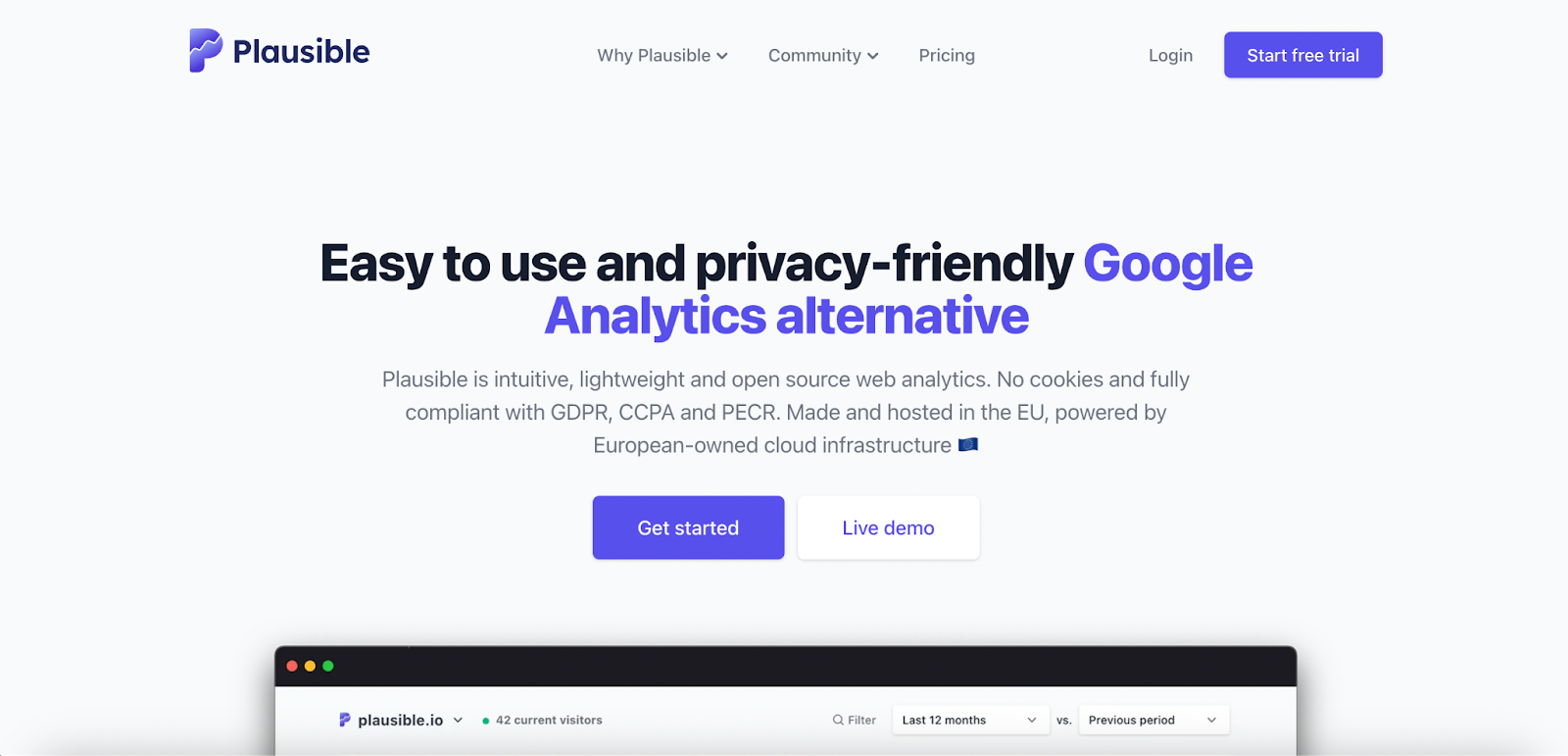
Plausible Analytics is a web analytics tool that furnishes website owners with insights regarding their site’s traffic. Unlike numerous other analytics tools, Plausible prioritizes privacy and refrains from tracking or gathering personally identifiable information about website visitors.
A standout feature of Plausible is its simplicity. Its dashboard is streamlined and user-friendly, offering website owners essential metrics like page views, unique visitors, and bounce rate.
Additionally, Plausible provides various other features such as event and goal tracking, traffic source analysis, and insights into popular pages.
Highlight features:
- Privacy-focused tracking: Uses a lightweight script without cookies for privacy compliance.
- Customizable tracking settings: Tailor tracking, exclude specific pages or IP addresses.
- Event and goal tracking: Track custom events like form submissions.
- Simple dashboard: Clean and user-friendly for optimizing websites.
Pros:
- Lightweight: Plausible ensures efficient performance without excessive resource consumption.
- Open-source: Offers transparency and flexibility, allowing users to modify the code.
- Cookieless: Enhances privacy compliance by not relying on cookies.
- EU cloud infrastructure: Data hosted on EU servers for compliance and potentially faster access.
Cons:
- Limited features: May lack some advanced functionalities.
- No audience reporting: Absence of audience demographics and behavior insights.
Pricing:
- Growth Plan: Starts at $9/month
- Business Plan: Starts at $19/month
- Enterprise Plan: Custom pricing
3. BeProfit - Profit Analytics
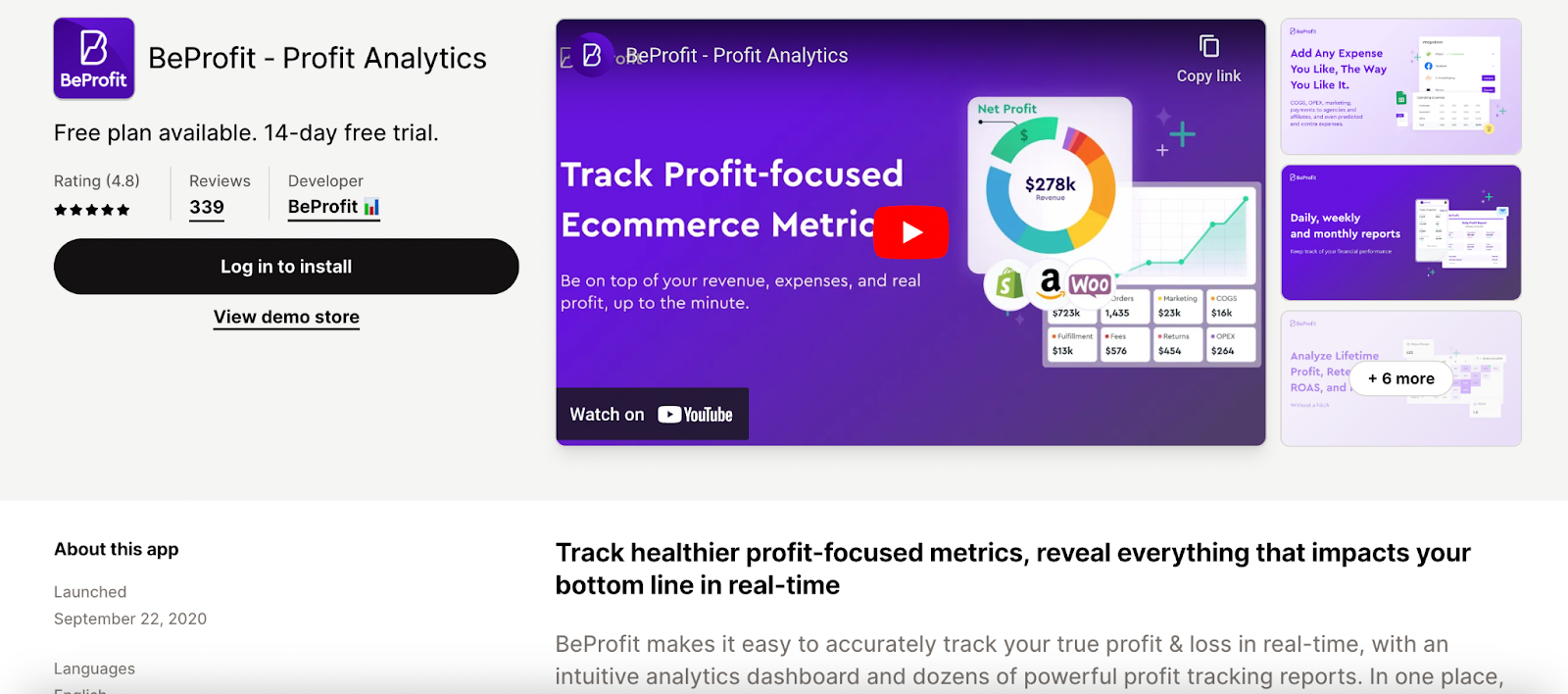
BeProfit - Profit Analytics is a profit analytics tool tailored to improve the financial management of e-commerce merchants. It streamlines profit calculations in real-time, replacing manual spreadsheets and making it easier to track transaction profitability. This automation is especially useful for merchants aiming for effective and precise financial management.
The app provides automated and customizable reports that merchants can schedule or access upon request. These reports offer thorough analytics across different areas like orders, shipping, inventory, and marketing expenses. Such detailed insights are essential for comprehending and enhancing business performance.
Highlight features:
- Detailed marketing reports analyzing campaign costs and performance across various ad platforms.
- Product performance analysis, tracking costs and sales for each item.
- Insights into customer buying habits through metrics like ROAS and LTV.
- Collaboration with team members through workspaces.
- Automatic syncing of business expenses and access to organized data on a user-friendly dashboard.
Pros:
- Real-time profit and loss tracking via an intuitive dashboard.
- Extensive integration with store platforms, marketing channels, and accounting systems for accurate reporting.
- Automated and custom report generation for thorough business analysis.
- User-friendly design suitable for users with varying technical expertise.
Cons:
- Price may be perceived as high for some smaller start-ups.
- Some users encountered issues with app disconnecting from ad channels, necessitating manual reconnection (resolved by support).
Pricing: 14-day free trial available
- Plus (Enterprise) Plan: Free to install
- Basic Plan: $250/month
- Ultimate Plan: $350/month
4. TrueProfit: Profit Analytics
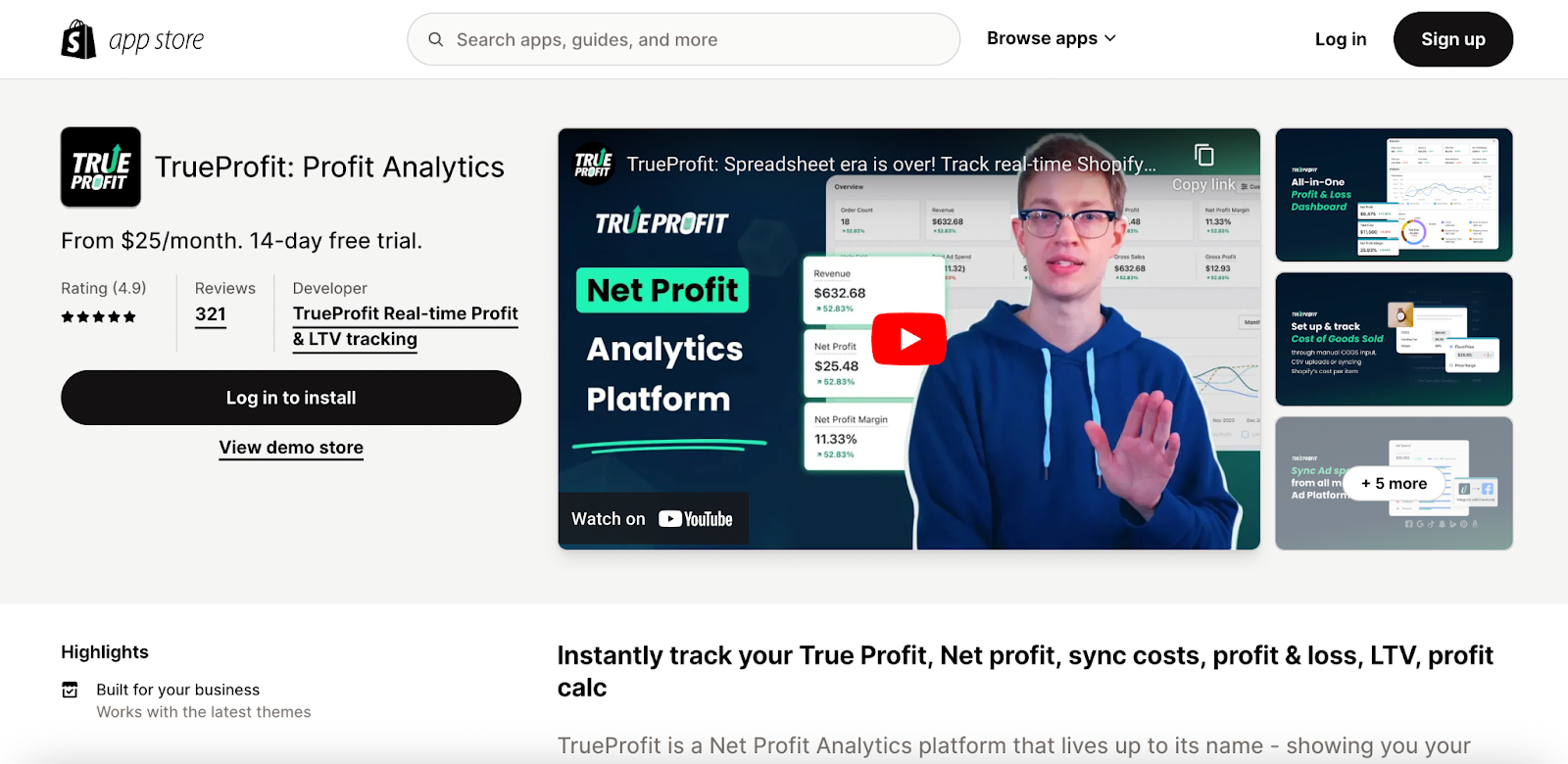
TrueProfit is a hassle-free platform that shows your online store’s real-time net profit automatically. No more manual spreadsheets – it gathers and analyzes all your order data in one place. With clear insights, you can make informed decisions and run a profitable, data-driven business effortlessly.
Highlight features:
- Net Profit tracker: Monitor your financial health with a real-time Profit Dashboard.
- Automatically track all expenses: COGS, shipping, fees, taxes, customs.
- Sync ad spends from Facebook, Google, TikTok, Bing, Snapchat, Amazon in real-time.
- Product Analytics & Marketing Attribution: Evaluate net profit at product and ad levels.
- Includes Customer Lifetime Value, P&L reports, mobile app, and all-store view.
Pros:
- Comprehensive profit calculations and metric tracking.
- Simple setup process with real-time monitoring.
- Responsive and supportive customer service.
- In-depth knowledge of margins and profits.
Cons:
- Pricing may be a concern, particularly for small businesses.
- Setup process can be complex.
Pricing: 14-day free trial available
- Basic Plan: $25/monthl
- Advanced Plan: $50/month
- Ultimate Plan: $100/month
- Enterprise Plan: $200/month
5. Mipler: Advanced Reports
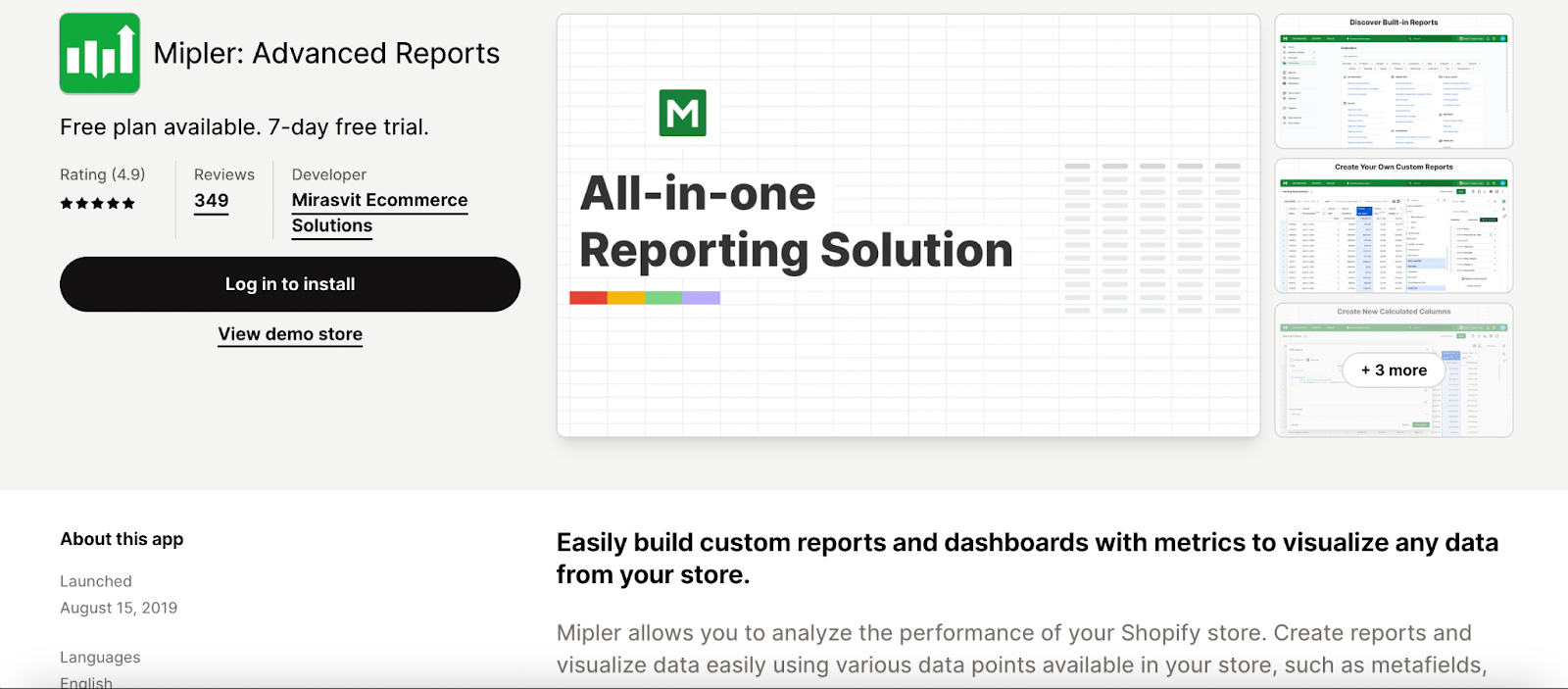
With Mipler, you can effortlessly generate reports and visualize data using a range of available data points including metafields, tags, and other properties. Dive into Sales Analytics, Financial reports, tax insights, inventory analysis, customer behavior, and easily export data.
Ideal for Shopify Plus users, Mipler also enables merging data from multiple stores into a single comprehensive report. Plus, its seamless integration with Google Sheets streamlines your workflow for maximum efficiency.
Highlight features:
- Free report service: Generate customized reports for you.
- Securely share reports via public links without requiring Shopify admin access.
- Schedule emails to send reports as attachments in CSV, Excel, or PDF formats.
- Access comprehensive insights utilizing tags, metafields, and note attributes.
- Make informed decisions based on real-time sales, product, and customer data.
Pros:
- Generate reports by products sold within a collection
- User-friendly interface
- Smooth Google Sheets integration Cons:
- Filters are not working properly
- Only works with POS systems
Pricing: 7-day free trial available
- Free Plan
- Starter Plan: $19.98/month
- Basic Plan: $29.99/month
- Optimal Plan: $39.99/month
6. Polar Analytics
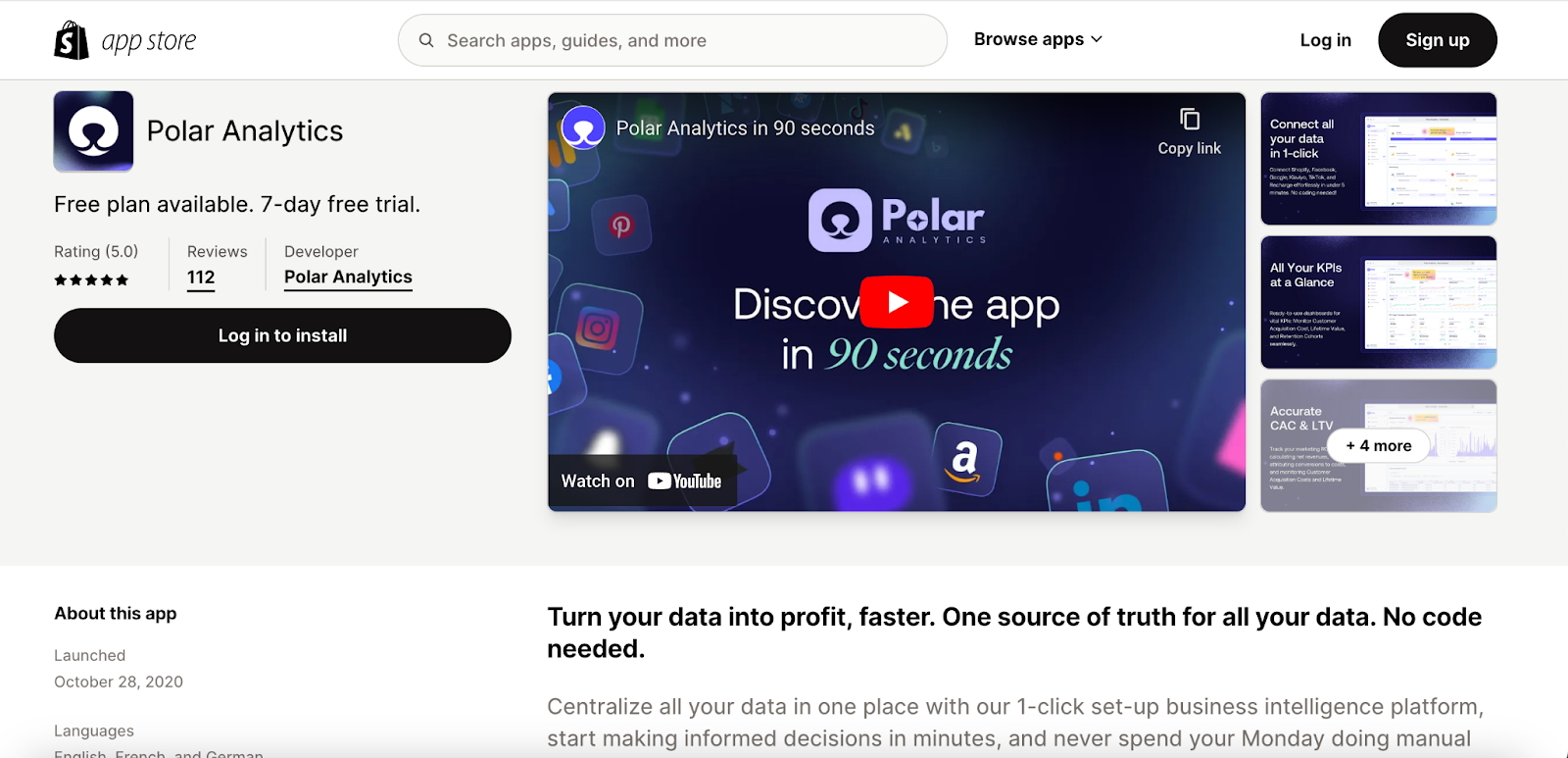
Polar Analytics software consolidates all your Shopify data insights, enabling customized dashboards for easy viewing of crucial KPIs.
Stay informed about critical metrics with smart alerts that send email or Slack screenshots, ensuring quick action to address any ROI-related issues.
Polar Analytics provides valuable marketing insights through integrations with platforms like Pinterest Ads, TikTok Ads, and Google Ads, among others.
Highlight features:
- Automated marketing and business reports for effortless monitoring.
- Unlimited users, facilitating easy sharing of dashboard insights with team members.
- User-friendly interface requiring no technical expertise.
- Unique visual reports on customer Lifetime Value (LTV) for identifying retention issues or improvement opportunities.
Pros:
- Expert-built analytics templates for conversion, profit, and ad spend analysis.
- Set and track goals with predictive forecasts.
- Polar Pixel offers accurate first-party attribution, enhancing ad algorithm effectiveness.
- Conversion API Enhancer increases ROAS by 20%.
Cons:
- Occasional slow switching between views and reports.
- Limited mobile report access.
Pricing: 7-day free trial available
- Enterprise Plan: Free to install
- Analyze Plan: $300/month
- Analyze & Enrich Plan: $450/month
7. Better Reports
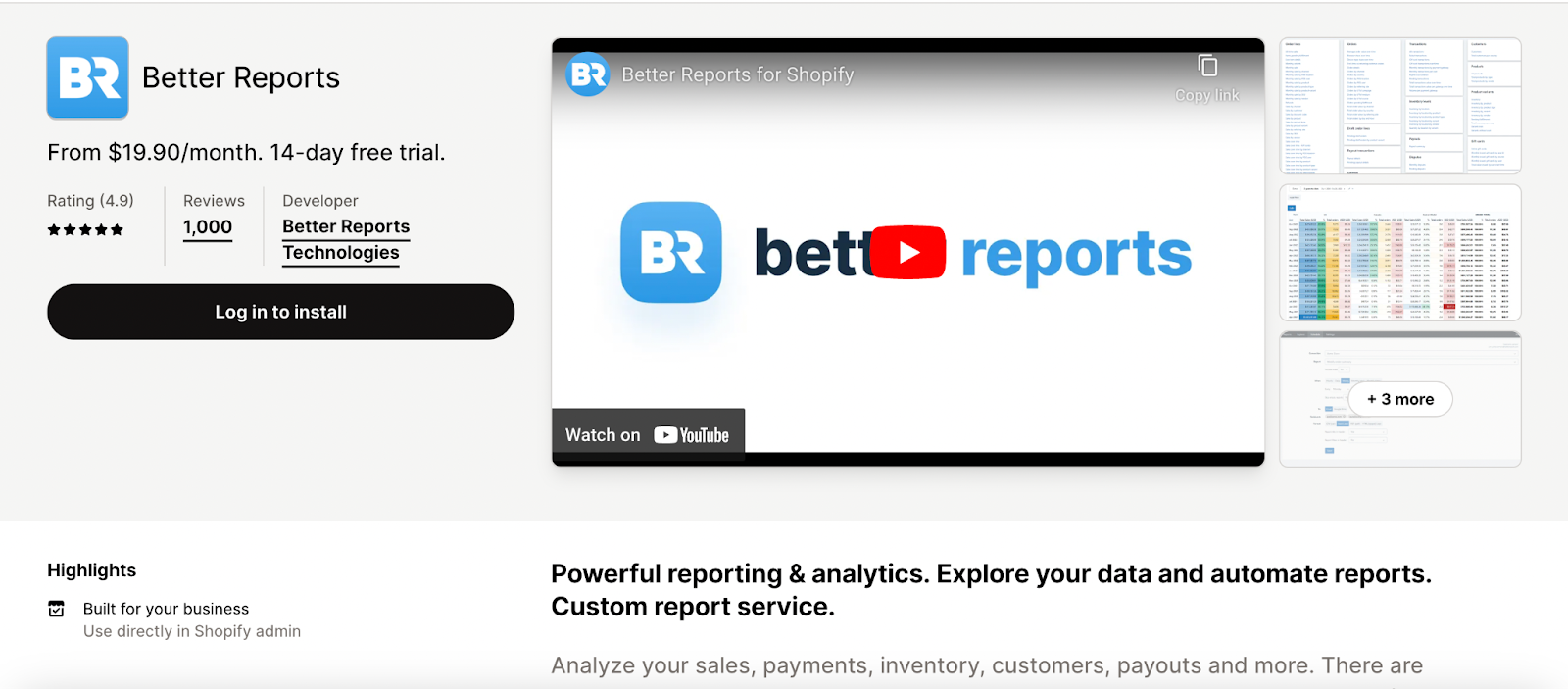
Better Reports is an advanced analytics tool tailored for Shopify store owners, providing a comprehensive set of features to enhance understanding and management across different business aspects. With access to a wide array of store data, including tags, metafields, and attributes, it offers a holistic view of business performance.
Noteworthy is its capacity to generate over 100 pre-built reports and customizable reports, addressing specific business needs through a visual report builder equipped with pivot tables and charts for deeper insights.
Highlight features:
- Comprehensive store data exploration, covering tags, metafields, attributes, and more.
- Customizable reports and metrics with multiple chart visuals.
- Complimentary report service for custom report creation.
- Sharing and exporting reports to PDF, Excel, CSV, and Google Sheets.
- Scheduled reports automatically sent via email or to Google Sheets.
Pros:
- Integrates with over 500 apps including Stripe, Help Scout, and QuickBooks Online.
- Entire team access for collaborative data analysis at no extra cost.
- Regular addition of new connectors based on user feedback.
- Deep customization options for tailored data analysis.
- Automated report emailing for timely insights sharing.
Cons:
- No free plan available.
- Some users suggest the app to improve the reports.
Pricing: 14-day free trial available
- Basic Shopify Plan: $19.90/month
- Shopify Plan: $39.90/month
- Advanced Plan: $149.90/month
- Shopify Plus Plan: $299.90/month
8. Report Toaster: Custom Reports
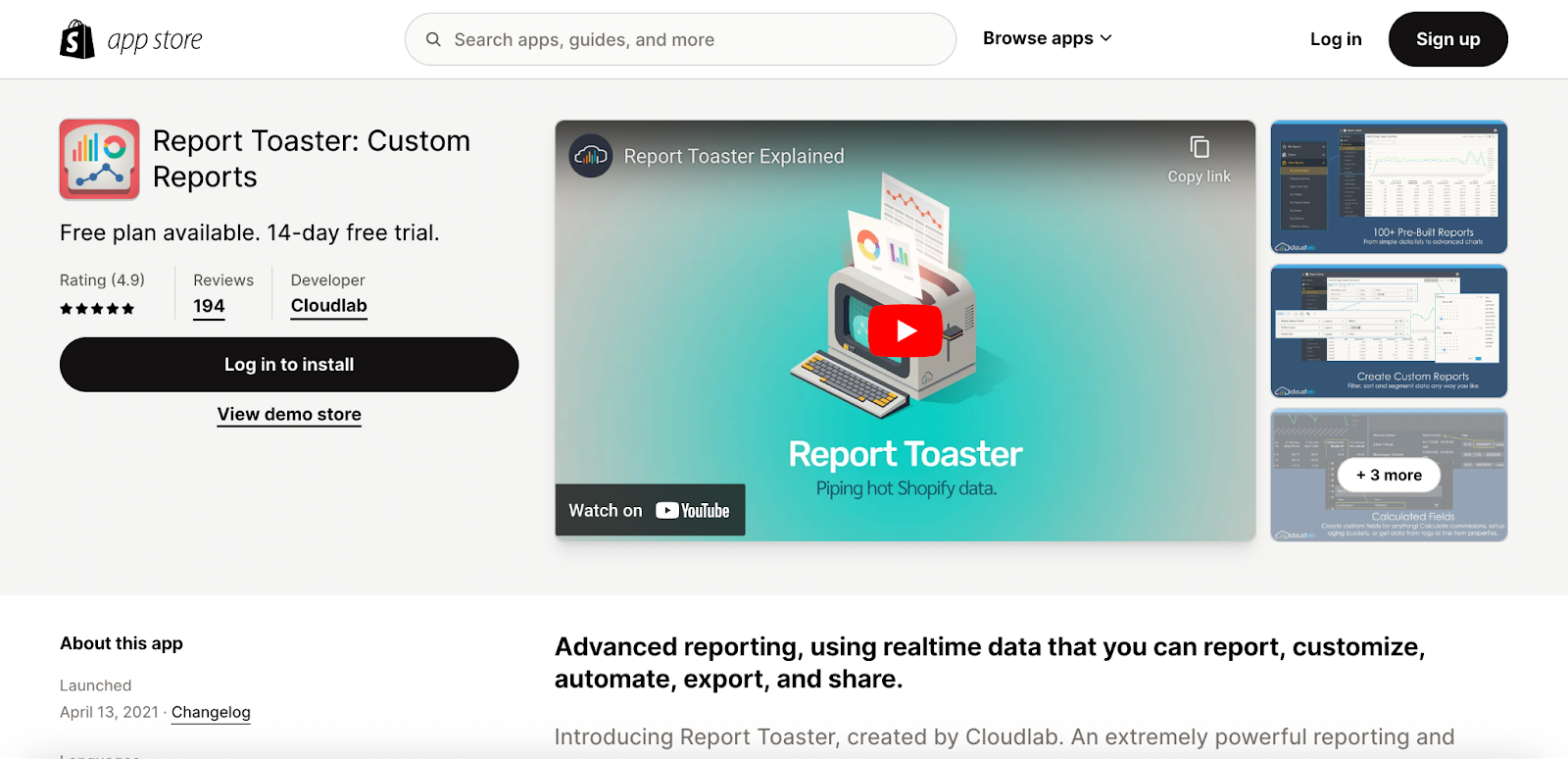
Introducing Report Toaster by Cloudlab, a robust reporting and analytics app for Shopify. Access real-time store data to create, schedule, and export custom reports for all your shops.
Customize reports with column additions, powerful filters, and multi-column sorting. Group, aggregate, and compare data over time, and utilize calculated fields for tasks like commission tracking or setting up aging reports.
Highlight features:
- Begin with any of our 120+ report templates to craft and store personalized reports.
- Export reports as PDF or CSV files for sharing via email or analysis in Excel.
- Schedule reports for automatic delivery via email, SMS, or Slack.
- Share live report links with team members or external parties.
- Utilize multi-store reporting to analyze and compare data from various shops.
Pros:
- Advanced, customizable reporting capabilities
- Easy to use
- Provide more data than Shopify, even in the free plan
Cons:
- Reported issues in free version
Pricing: 14-day free trial available
- Free Plan
- Basic/Shopify Plan: $9/month
- Advanced Plan: $30/month
- Plus Plan: $150/month
9. Track123 Order Tracking
![]()
Track123 Order Tracking presents an innovative solution tailored for Shopify stores, focusing on enhancing the post-purchase customer journey. It offers detailed order tracking alongside a unique upsell feature embedded within the tracking page.
Highlight features:
- Efficient order lookup with a branded tracking page and automatic email notifications based on order status.
- Includes dropshipping mode to hide specific keywords/carriers in tracking details.
- Automatically syncs PayPal tracking, displays Estimated Delivery Date, and minimizes WISMO calls.
- Enhance sales with personalized product recommendations alongside order tracking.
- Comprehensive analytics for insights into track and trace performance.
Pros:
- Real-time order tracking and robust analytics.
- Customizable tracking page and automated notifications enhance customer engagement.
- Effective cross-selling capabilities with personalized product recommendations.
- Support for a vast array of couriers and seamless integration with major platforms.
- Free plan available, catering to new or small businesses.
Cons:
- May not suit all business models.
- Some users have reported occasional technical glitches.
Pricing: 7-day free trial available
- Starter Plan: $7.99/month
- Standard Plan: $19.99/month
- Professional Plan: $39.99/month
- Premium Plan: $89.99/month
10. Lifetimely LTV & Profit by AMP
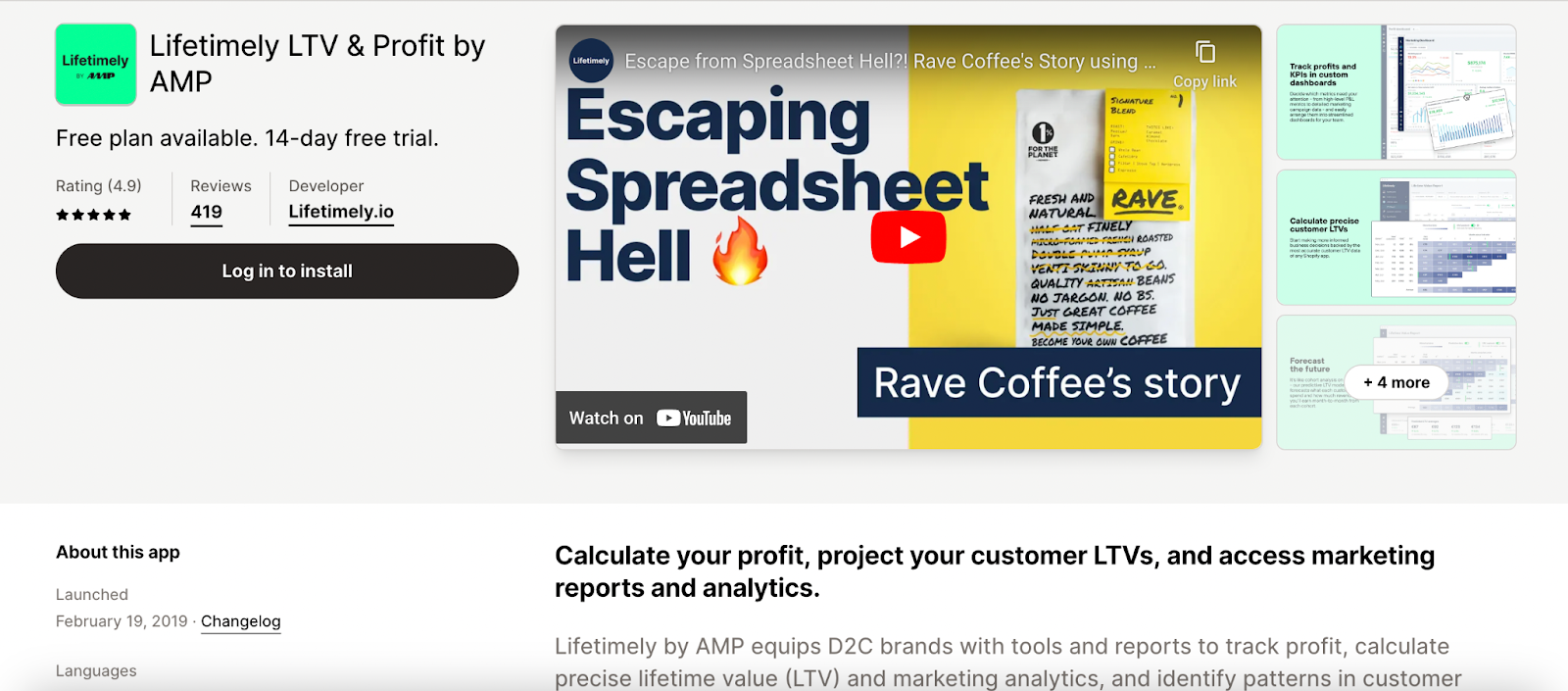
Lifetimely& Profit by AMP offers a comprehensive suite of analytics tools and P&L dashboards, ensuring you have everything you need to track profitability and calculate lifetime value (LTV) accurately.
With its industry-leading cohort analyses, email reports, CAC payback tools, and other features, Lifetimely is recognized as one of the top analytics apps for Shopify. It provides valuable insights into customer behavior patterns, making it the perfect solution for gaining deep insights into your shop’s success.
Highlight features:
- All-inclusive P&L, marketing, and shipping integrations.
- Dashboard and email reports that can be customized.
- Advanced cohort analysis filters and CAC calculators.
- Precise LTV and revenue forecasts.
- Detailed reports on customer purchasing patterns.
Pros:
- Provide a simple daily update on client’s KPIs.
- Help to understand what products generate more repeat and how often customers are ordering.
Cons:
- Reportedly poor customer support.
- Wrong LTV calculation reported.
Pricing: 14-day free trial available
- Free Plan
- Basic Plan: $34/month
- Pro Plan: $75/month
- Plus Plan: $149/month
Conclusion
Comparing and evaluating features among different Analytics Shopify apps can be time-consuming and demanding for store owners. It requires thorough consideration of relevant information to make the best choice tailored to their needs.
To ease this process, this guide undertakes the challenging task of comparing and evaluating the top choices among Analytics Shopify apps. We hope this guide simplifies the decision-making process for merchants and assists them in finding the optimal solution.




